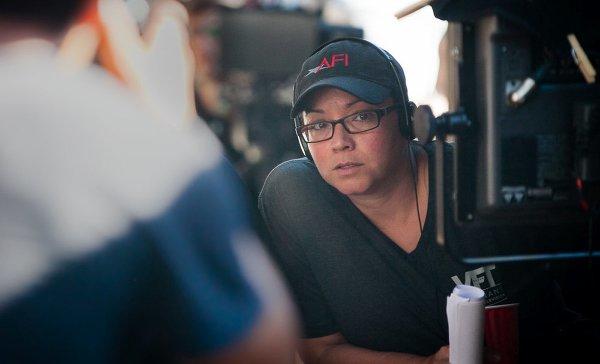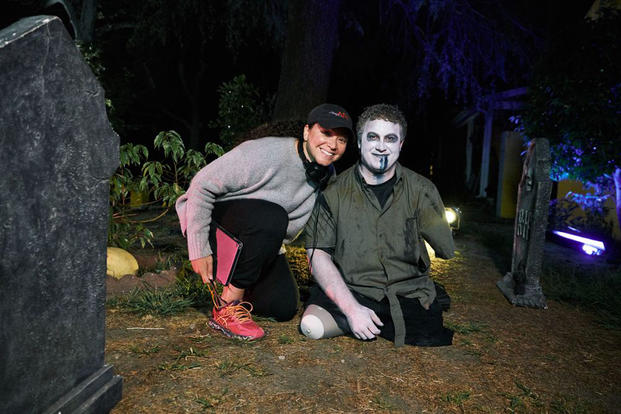Rebecca Murga’s path to the military was a direct one -- members of a film crew she worked for were shooting in New York on 9/11. After the tragedy, she resolved to join the Army, where she continued doing what she does best: tell stories. She has worked as a film writer, editor and director all across the globe, from Iraq, Kuwait and Afghanistan to North and South America.
Since leaving service, Murga has worked as a writer and director for the American Film Institute and as a media manager and segment producer for Fox Television. She was recently selected for the highly regarded Disney/ABC Directing Program, a two-year professional training program.
Murga is a stalwart advocate for veterans. She has directed the short documentary "War Ink," a project that tells veterans’ stories through their tattoos. Most recently, she finished "One Halloween"; a short film that follows a wounded Afghanistan war veteran through one Halloween night as he tries to connect with his 10-year-old daughter on his first day home after being released from the hospital.

Whether you want to leverage your military expertise as a film consultant behind the scenes, act or direct, Murga has a few tips for you:
1. Be Flexible and Do the Work.
The job you held in the military is never going to correlate exactly with what you want to do on set unless you are a photographer, and even then, it is a different beast. Take time to learn and realize this is a new career.
I have seen veterans get frustrated because they are not moving up the ladder more quickly. It is a different structure than the military. It doesn’t matter about your time in grade; all that matters is the content you make and the network that you have. And if you have to make 100 short films to get one good one, well then do it.
Put in the work. Don’t think that first script you write is the only one you need. Write another. And another. Keep writing until you actually come out with a good script … and after that, write another one.
2. Find a Network
Veterans in Media and Entertainment (formerly Veterans in Film and Television) is the group that I look to as an incredible network. It's a group of veterans who are working as writers, actors, directors, producers, photographers, etc.
You need friends in this industry who are like-minded, and not just friends to hang out with -- a group of collaborators you can honestly go to and ask their opinions. And get honest feedback. It doesn’t help when people say to me, “Good work.”
What helps is when they give honest, thoughtful feedback that I can use to make myself better. Find a good group of people and hang on to them.
3. Keep Learning, Growing and Creating
I make it a point always to be in some point of production. I am either in pre-production, on set or in post. You will get better after every project. I always want to be on set. I always want to keep my directing skills sharp.
I want to be better. When I look at the great filmmakers, they spent the early part of their careers creating a ton of films. And guess what? Some of those films were bad. A ton of bad films are made every year before we get to see that "Whiplash" or that "Moonlight."
If you want to be in this industry: Watch films. Watch a lot of films. Learn from the greats; watch them for their pacing and shot selection. If you are an actor, find a group of folks and create something every year. Get on set.
Yes, it's OK to work for free. It is expected. Unless you are great, no one is going to pay you to learn or get better. And in that creating, your network will grow.
4. Read the Trades
Deadline. Variety. The Hollywood Reporter. Read them. Know what is going on. What deals are being made. What production companies produce the kind of films you like. Find trends, what is being picked up and what is not.
5. Pick a Track
This is a difficult industry. I run into people all the time who say things like, “Well, I’m an actor and a producer and a screenwriter and a grip on weekends.” Pick one. Master that one thing.
It doesn’t mean you can’t try other things out. And it doesn’t mean you can't work in different parts of the industry. But I started getting directing jobs when I stopped taking editing jobs. I was a director and didn’t want to focus on anything else.
Focus on that one thing. Get really good at it and then try other fields out.
Related: For the latest veteran jobs postings around the country, visit the Military.com Job Search section.
The Next Step: Find the Right Job
Whether you want to polish up your resume, find veteran job fairs in your area, or connect with employers looking to hire veterans, Military.com can help. Sign up for a free Military.com membership to have job postings, guides and advice, and more delivered directly to your inbox.












